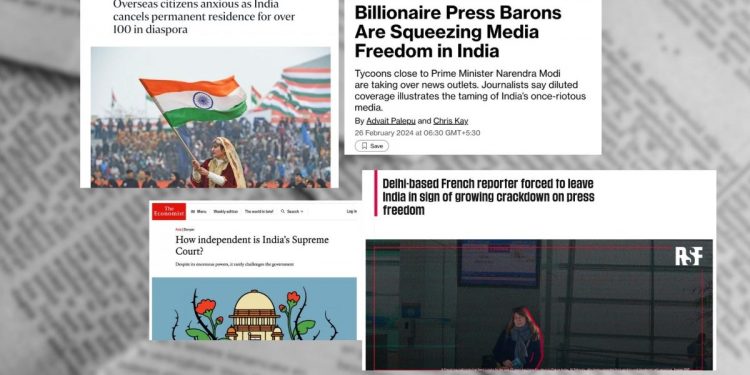The Narendra Modi government frequently posits India as a ‘Vishwaguru’ or world leader. How the world really sees India is often lost in this branding exercise.
Outside India, global voices are monitoring and critiquing human rights violations in India and the rise of Hindutva. We present here fortnightly highlights of what a range of actors – from UN experts and civil society groups to international media and parliamentarians of many countries – are saying about the state of India’s democracy.
Read this fortnightly roundup for February 15-29, 2024.
International media reports
The Economist, London
An editorial on February 21 describes the “decade-long attack” of the ruling BJP on India’s civil society as a “crackdown.” Of those who lost their foreign-funding licenses, other than “ideological opponents”, “more than half were Christian or Muslim,” it says.
The Economist, London
Banyan, the magazine’s Asia columnist, writes on February 22 that the role of India’s Supreme Court as “an independent bulwark against the excesses of the ruling party” stands “severely diminished”.
The Strait Times, Singapore
Rohini Mohan reports on February 24 that the Indian government has summarily revoked Professor Ashok Swain’s Overseas Citizen of India (OCI) status, one of over 100 OCI cancellations in the last nine years. A professor of Peace and Conflict studies in Sweden, Swain is accused of “anti-India activities”. Many in the Indian diaspora did not speak to Mohan for fear of reprisal.
Middle East Eye, London
Azad Essa reports on February 25 that the Haryana police’s use of drones to fire tear gas on protesting farmers comes from the state Chief Minister’s aim to “replicate” Israeli “police and army tactics”, after his visit to Israel during protests in 2018.
The Independent, London
On being denied entry to Karnataka, on the “orders of Delhi”, the UK-based academic Nitasha Kaul says to the news outlet on February 27 that she was refused “because of her opinions on democratic and constitutional values”. Kaul had a valid visa to attend a two-day convention on the Constitution and National Unity organised by the state government.
The Bloomberg, New York
Advait Palepu and Chris Kay recount on February 26 the story of NDTV, once “one of the country’s most fearlessly independent news outlets” to show how billionaire press barons close to Modi are “squeezing media freedom in India” and taming India’s “once-riotous media”.
Parliamentarians’ advocate
British MP Tanmanjeet Singh Desi on February 22 shared concerns on the floor of Parliament about the safety of protesting farmers and censorship regarding this on X. In response, the Deputy Speaker gave an assurance that “this very serious situation” would be taken up by the relevant Minister.
Experts say
Oxford Human Rights Hub in a recent report on educational institutions across Australia, India and South Africa, summarised that in India the challenges are “most acute”, including “restrictions on institutional autonomy; political appointments; harassment of dissenters” and “self-censorship.”
Amnesty International released a statement on February 14 about the “crackdown” on the recent farmers’ protests. It called upon the Indian authorities to “urgently de-escalate the situation and guarantee the rights to freedom of expression, peaceful assembly and movement.”
Reporters Without Borders issued a statement on February 16 over the expulsion of French journalist Vanessa Dougnac, India’s longest-serving foreign correspondent. It said that this action “reveals a very dark and deplorable image of what press freedom has become under Prime Minister Narendra Modi.”
Christophe Jaffrelot, professor and eminent scholar of Indian politics, assessing Prime Minister Modi’s 10-year political legacy in an interview with The Wire says “the national scene is a landscape of divisions” based on religion, caste and class.”
The European Commission on February 28 published the findings of a trade and sustainability impact assessment by an independent team, during negotiations on the EU-India Free Trade Agreement (FTA). It underlines that the FTA is “likely to affect” human and labour rights in India and “existing vulnerabilities”, including discrimination on caste, religion and gender, which may lead to “negative impacts”.
Indian diaspora groups protest and advocate
Four US-based organisations – Equality Labs, Hindus For Human Rights, Indian American Muslim Council and the Sikh American Legal Defence and Education Fund –published a report on February 21 on sweeping “tech-based censorship” by the Indian state against “protesting” diasporic groups and individuals.
InSAF India, an international coalition supporting academic freedom in India, hosted a lecture on February 18, titled “The Crisis Within: On Knowledge and Education in India” by Professor G.N Devy, which was slated to be held at IIT Mumbai on 31 January 2024 but cancelled just a day before. It was part of The Missing Lecture Series which provides a platform for lectures cancelled due to “authoritarian suppression”.
India Hate Lab, a Washington D.C.-based research group run by a dedicated team of journalists, academicians, and researchers, on February 25 released a report on hate speech in India in 2023, finding that 75% of anti-Muslim hate speech it documented occurred in BJP-ruled states. Over a fifth of all events that took place after Hamas’s attack on Israel mentioned the Israel-Gaza war to stoke hatred against Muslims in India.
The US-based Hindus for Human Rights’ recent Desh Videsh Conversation Series offered an event, which brought together Palestinian, Muslim, Jewish, Hindu and other panelists, who highlighted several parallels between Zionism and Hindutva including exclusionary dimensions, denial of equal rights to all citizens and weaponization of accusations of antisemitism and Hinduphobia to silence dissent and criticism.
This news feature is republished from The Wire. Read the original article.











